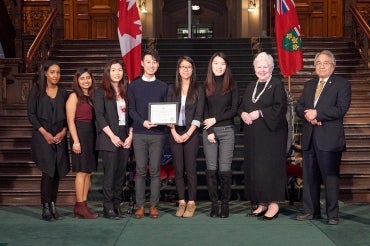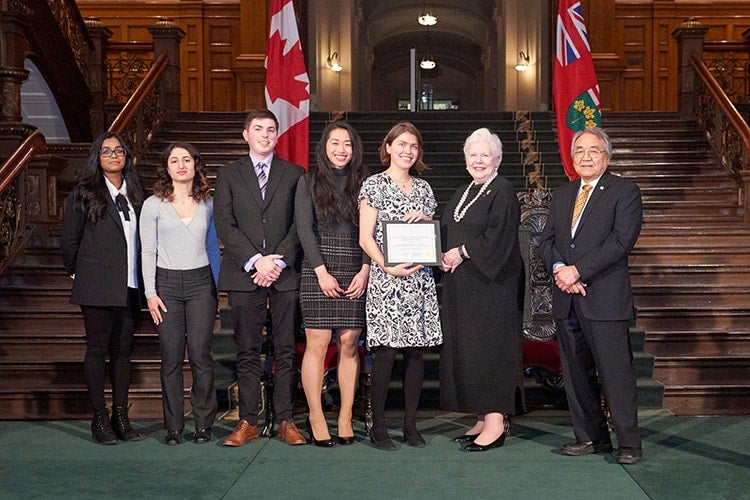Two student-developed digital media projects recognized with heritage awards

Published: March 14, 2018
An augmented reality app that guides users through a dynamic tour of 12 locations in Toronto’s historic Kensington Market.
A podcast that explores the experiences of Indigenous and immigrant communities living in Scarborough.
The two projects developed by students as part of University of Toronto courses were honoured recently with the Lieutenant Governor’s Ontario Heritage Award for Youth Achievement from the Ontario Heritage Trust.
Lt.-Gov. Elizabeth Dowdeswell and Ontario Heritage Trust chair Harvey McCue presented the awards to some of the students behind the projects at a ceremony recently at Queen’s Park, an annual event that recognizes contributions to cultural and natural heritage conservation, environmental sustainability and biodiversity by individuals and groups from across Ontario.
The Kensington Market: Hidden Histories app, which brings to life the layers of stories embedded in the area, was made possible by students in University College’s Digital Tools in a Canadian Context course. A companion online interactive map archives histories of 32 locations.
Read more about the app
“Receiving this award felt like it wasn’t just recognizing us students, but also the sites and locations in Kensington Market featured in our project,” said fourth-year student Arabhi Ratnajothy. “It is a reminder that so much of this city was built by immigrants who engrained themselves and their stories into the paths walked by today’s generations. We move towards the future by remembering the past.”

(From left) Arabhi Ratnajothy, Natalie Simonian, Chris Lemire, Sally Zeng, Nicole Paroyan, Lt.-Gov. Elizabeth Dowdeswell, Harvey McCue, chair of the Ontario Heritage Trust (photo by Ian Crysler, courtesy of the Ontario Heritage Trust
“Being selected for this award is such a terrific boost and affirmation for each of the students,” said course instructor Siobhan O’Flynn. “Having the opportunity to work on a project, be engaged in original research and contribute to the safeguarding of our city's intangible cultural heritage as undergraduates is remarkable.”
Students worked with local tech developer No Campfire Required conducting extensive research in the City of Toronto and the Ontario Jewish archives, as well as interviews with Kensington Market residents and business owners.
Sixteen students of the Migration and Ethnicity (SOCD15) course at U of T Scarborough focused on amplifying the voices of marginalized Scarborough communities by developing the “Negotiating Multiple Worlds” podcast.
The course sets out to contextualize contemporary Scarborough by tracing its development from a site utilized and cared for by Indigenous Peoples to a white, middle-class suburb and now an emerging “immigrant gateway.” It acknowledges Indigenous struggles and dispossession of land, and focuses on social barriers encountered by immigrants in Scarborough.
Paloma Villegas, an assistant professor in the department of sociology, said she hopes students will leave the course with an adept understanding of “migration-related content [pertaining] to Scarborough, qualitative research skills, and alternative modes of presenting information.”
Villegas believes that by designing the course around podcasts and digital media production, students will leave with more varied skills. “Usually in sociology we write papers and reports. This allows students to learn skills that will hopefully make them better candidates for the job market and/or graduate school,” she said.
Hiba Ibrahim is one of the students who contributed to “Negotiating Multiple Worlds.” With three other classmates, Ibrahim conducted a series of interviews with South Asian women of different age groups, asking them about their experiences as immigrants in Scarborough.
“We found that the struggles encountered by immigrant women were more similar than not across each age group, particularly when adopting a new language. One woman arrived when she was four and took ESL classes but still struggled because she didn’t speak it at home,” said Ibrahim.
“There are also very few programs designed to help newcomers learn the language and continue careers. Many of them arrived with degrees that aren’t valid here,” she added. “In that sense, younger arrivals had some advantage being raised in a Canadian school system.”
Ibrahim's group did not end up releasing its podcast episode because a participant chose not to have their interview made public.
Other groups produced segments on immigrant food-industry entrepreneurs in Scarborough and schooling opportunities for immigrants aged 13 to 18.

